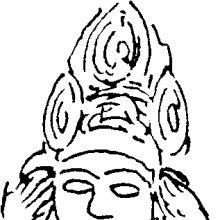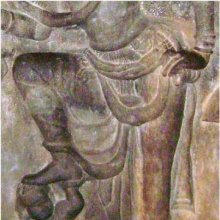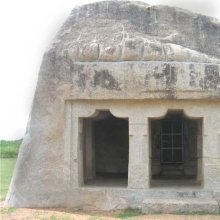Griha, Gṛha: 31 definitions
Introduction:
Griha means something in Buddhism, Pali, Hinduism, Sanskrit, Jainism, Prakrit, the history of ancient India, Marathi, Hindi. If you want to know the exact meaning, history, etymology or English translation of this term then check out the descriptions on this page. Add your comment or reference to a book if you want to contribute to this summary article.
The Sanskrit term Gṛha can be transliterated into English as Grha or Griha, using the IAST transliteration scheme (?).
Images (photo gallery)
In Hinduism
Vastushastra (architecture)
Source: Wisdom Library: Vāstu-śāstraGṛha (गृह) is a Sanskrit technical term denoting a “residence” in general, according to the lists of synonyms given in the Mayamata XIX.10-12, the Mānasāra XIX.108-12 and the Samarāṅgaṇa-sūtradhāra XVIII.8-9, all populair treatises on Vāstuśāstra literature.
Source: OpenEdition books: Architectural terms contained in Ajitāgama and RauravāgamaGṛha (गृह) refers to “temple § 4.2.”.—(For paragraphs cf. Les enseignements architecturaux de l'Ajitāgama et du Rauravāgama by Bruno Dagens)
Source: Brill: Śaivism and the Tantric Traditions (architecture)Gṛha (गृह) refers to a “house (for ascetics)”, according to the Mohacūrottara (verse 4.234-243).—Accordingly, [while describing the construction of the maṭha]—“And a maṭha for ascetics to stay in should be in the south. For they, as devotees of Śiva, should reside to the right [of Śiva]. One should build a wall at a distance 1 temple-width beyond the temple base. At a distance from there is the housing for ascetics (gṛha—āśramiṇāṃ gṛhaṃ). [...]”.
Source: Shodhganga: Elements of Art and Architecture in the Trtiyakhanda of the Visnudharmottarapurana (vastu)Gṛha (गृह) refers to one of the hundred types of Temples (in ancient Indian architecture), according to the Viṣṇudharmottarapurāṇa, an ancient Sanskrit text which (being encyclopedic in nature) deals with a variety of cultural topics such as arts, architecture, music, grammar and astronomy.—It is quite difficult to say about a definite number of varieties of Hindu temples but in the Viṣṇudharmottarapurāṇa hundred varieties of temples have been enumerated. For example, Gṛha. These temples are classified according to the particular shape, amount of storeys and other common elements, such as the number of pavilions, doors and roofs.

Vastushastra (वास्तुशास्त्र, vāstuśāstra) refers to the ancient Indian science (shastra) of architecture (vastu), dealing with topics such architecture, sculpture, town-building, fort building and various other constructions. Vastu also deals with the philosophy of the architectural relation with the cosmic universe.
Purana and Itihasa (epic history)
Source: archive.org: Nilamata Purana: a cultural and literary studyGṛha (गृह) is the name for a “building” that once existed in ancient Kashmir (Kaśmīra) as mentioned in the Nīlamatapurāṇa.—The terms—bhavana, gṛha, niveśana, ālaya, veśma, āyatana, aṭṭālaka etc. have been used in the Nīlamata for buildings but it is not possible to distinguish between the significance of one term and the other. No example of the period of the Nīlamata has been preserved. The Nīlamata says nothing about the building-materials. All that is known about the houses mentioned in the Nīlamata is that those had doors and ventilators and were whitewashed. The decoration of houses with fruits, leaves and garlands of rice-plants is also referred to.
Source: archive.org: Shiva Purana - English TranslationGṛha (गृह) refers to a “householder”, according to the Śivapurāṇa 2.3.27 (“Description of the fraudulent words of the Brahmacārin”).—Accordingly, as Śiva (in guise of a Brahmacārin) said to Pārvatī: “[...] I know Śiva through and through with all His weighty attributes. I shall tell you the truth. Listen with attention. [...] He holds the skull. Serpents twine round His limbs. Poison has left a mark on his neck. He eats even forbidden stuffs. He has odd eyes and is definitely awful. His birth and pedigree cannot be traced. He is devoid of the enjoyment of a householder [i.e., gṛha-bhoga-vivarjita]. He has ten arms. He is mostly naked and is ever accompanied by ghosts and goblins. [...]”.
Source: Cologne Digital Sanskrit Dictionaries: The Purana IndexGṛha (गृह).—Of mud becomes secure by mud plaster—illustrative of body being nourished by vegetables and rice.*
- * Viṣṇu-purāṇa II. 15. 29.

The Purana (पुराण, purāṇas) refers to Sanskrit literature preserving ancient India’s vast cultural history, including historical legends, religious ceremonies, various arts and sciences. The eighteen mahapuranas total over 400,000 shlokas (metrical couplets) and date to at least several centuries BCE.
Shaktism (Shakta philosophy)
Source: Google Books: ManthanabhairavatantramGṛha (गृह) refers to the “house” (of Kula), according to the Manthānabhairavatantra, a vast sprawling work that belongs to a corpus of Tantric texts concerned with the worship of the goddess Kubjikā.—The Triangle is also commonly said to be the abode or “hermitage” (āśrama) of the Kubjikā tradition. As such it is called the House (gṛha, veśman) of Kula or House of the Lineage (anvaya) of Kula because, from this point of view, it is the ultimate source of all the Kula traditions. This source is implicitly identified with the Kubjikā tradition by referring to the Triangle as the Western House (paścimagṛha, paścimaveśman). Also called the House of the City of the Moon, it is the House, that is, the family (kula) or lineage, into which the goddess is born.

Shakta (शाक्त, śākta) or Shaktism (śāktism) represents a tradition of Hinduism where the Goddess (Devi) is revered and worshipped. Shakta literature includes a range of scriptures, including various Agamas and Tantras, although its roots may be traced back to the Vedas.
Jyotisha (astronomy and astrology)
Source: Wisdom Library: Brihat Samhita by VarahamihiraGṛha (गृह) refers to “houses”, according to the Bṛhatsaṃhitā (chapter 11), an encyclopedic Sanskrit work written by Varāhamihira mainly focusing on the science of ancient Indian astronomy astronomy (Jyotiṣa).— Accordingly, “Raśmi Ketu is a comet possessing a tail slightly coloured like smoke; it appears in the constellation of Kṛttikā. The effects are the same as those assigned to Sveta Ketu. Dhruva Ketu is a comet possessing no fixed course, colour or shape and appears anywhere in the heavens, in the sky and on Earth. When it appears glossy, mankind will be happy. To those whose death might be near this Ketu appears in the several divisions of the King’s army, in houses, in trees, in hills [i.e., gṛha-taru-śaila] and in household utensils”.

Jyotisha (ज्योतिष, jyotiṣa or jyotish) refers to ‘astronomy’ or “Vedic astrology” and represents the fifth of the six Vedangas (additional sciences to be studied along with the Vedas). Jyotisha concerns itself with the study and prediction of the movements of celestial bodies, in order to calculate the auspicious time for rituals and ceremonies.
Shaivism (Shaiva philosophy)
Source: Brill: Śaivism and the Tantric Traditions (philosophy)Gṛha (गृह) refers to a “house”, according to the Utpaladeva’s Vivṛti on Īśvarapratyabhijñākārikā 1.5.8-9.—Accordingly, “[...] [—Objection from the Sautrāntika:] But just as [you] have said that [in the case of the inference of the sense organs,] the generality ‘causality’ has already been experienced through the experience of [particular causes] such as a seed, without considering the particulars that are the visual organ and so on, in the same way, [you must admit that] externality too has already been experienced as a generality from the experience of [various objects that are] external to the body (śarīra), the house (gṛha) or the village (grāma), etc. [...]”.
Source: SOAS University of London: Protective Rites in the Netra TantraGṛha (गृह) refers to the “palace”, according to the Netratantra of Kṣemarāja: a Śaiva text from the 9th century in which Śiva (Bhairava) teaches Pārvatī topics such as metaphysics, cosmology, and soteriology.—Accordingly, [verse 19.114-116, while describing the king’s consecration]—“[...] Then [the Mantrin] should carry out the sacrifice—[which] confers siddhi—within the palace (gṛha—gṛhe yāgaṃ tu kārayet) using the method described earlier with abundant oblation, for as long as seven days, O Devi. [The king] then acquires great royal fortune [and an] unconquerable kingdom, as [he] desires. And the king will obtain the siddhis of the earth and sky. Then, the [Mantrin who performs] the nīrājana achieves [for himself] all the very best things, [and] destroys the aforementioned faults. O Devi, this is certain to take place”.

Shaiva (शैव, śaiva) or Shaivism (śaivism) represents a tradition of Hinduism worshiping Shiva as the supreme being. Closely related to Shaktism, Shaiva literature includes a range of scriptures, including Tantras, while the root of this tradition may be traced back to the ancient Vedas.
Kavya (poetry)
Source: Brill: Śaivism and the Tantric Traditions (kavya)Gṛha (गृह) refers to “one’s home”, according to Kālidāsa’s Raghuvaṃśa verse 9.78.—Accordingly: “Therefore, although the sun may fall to earth, or Himālaya lose its fixity, I’ll not return home (gṛha) like a common man, whose senses yearn for sensual things, and who has not perceived the truth”.

Kavya (काव्य, kavya) refers to Sanskrit poetry, a popular ancient Indian tradition of literature. There have been many Sanskrit poets over the ages, hailing from ancient India and beyond. This topic includes mahakavya, or ‘epic poetry’ and natya, or ‘dramatic poetry’.
General definition (in Hinduism)
Source: archive.org: Vedic index of Names and SubjectsGṛha (गृह) is used in the singular, or oftener in the plural, to denote the ‘house’ of the Vedic Indian. Dama or Dam has the same sense, while Pastyā and Harmya denote more especially the home with its surroundings, the family settlement. The house held not only the family, which might be of considerable size, but also the cattle and the sheep at night. It was composed of several rooms, as the use of the plural indicates, and it could be securely shut up. The door (dvār, dvāra) is often referred to, and from it the house is called Duroṇa. In every house the fire was kept burning.6
In Buddhism
Mahayana (major branch of Buddhism)
Source: Wisdom Library: Maha Prajnaparamita SastraGṛha (गृह) refers to “houses” and is mentioned among the “material benefits” granted by the Bodhisattva, according to the Mahāprajñāpāramitāśāstra chapter XLVI.—Accordingly, “houses (gṛha) such as dwellings (harmya), palaces (rājakula), temples (prāsāda), etc., built of earth, wood or precious objects, to protect from cold (śīta), heat (uṣṇa), wind (vāta), rain (vṛṣṭi), thieves (caura)”.
Source: academia.edu: A Study and Translation of the GaganagañjaparipṛcchāGṛha (गृह) refers to “houses”, according to the Gaganagañjaparipṛcchā: the eighth chapter of the Mahāsaṃnipāta (a collection of Mahāyāna Buddhist Sūtras).—Accordingly: “Then the Bodhisattva Apāyajaha addressed himself to the Bodhisattva Gaganagañja: ‘Son of good family, please pacify three evil existences’. [...] Then, the rain of gifts, such as [...] chariots, foot-soldiers, vehicles, houses (gṛha), villages, cities, towns, provinces, kingdoms, capitals, gardens, pavilions, palaces, portals, windows, half-moon shaped decorations on building, thrones, palanquin, and chariots drawn by four cattle, sixteen cattle, and a thousand of good horses, poured down from the open space. [...]”.

Mahayana (महायान, mahāyāna) is a major branch of Buddhism focusing on the path of a Bodhisattva (spiritual aspirants/ enlightened beings). Extant literature is vast and primarely composed in the Sanskrit language. There are many sūtras of which some of the earliest are the various Prajñāpāramitā sūtras.
Tibetan Buddhism (Vajrayana or tantric Buddhism)
Source: MDPI Books: The Ocean of HeroesGṛha (गृह) refers to a “house”, according to the 10th-century Ḍākārṇava-tantra: one of the last Tibetan Tantric scriptures belonging to the Buddhist Saṃvara tradition consisting of 51 chapters.—Accordingly: “Now, [the Blessed One] has taught [holy sites] such as the pīlava and upapīlava in sequence. [...] The pīlava [sites] are recited to be the border of a village, Kuṅkara (for Koṅkana), Karmāra-pāṭaka (or a district of [many] artisans), and the village where many Yoginīs reside. [Every site is] powerful. (12) Likewise, in this [system], the upapīlava [sites] are an ancestor forest, a side of a house (gṛha-pārśva), a pond, and a lotus pool. Girls who are in these places are of [the nature of] the innate, born in their own birthplaces. [...]”.

Tibetan Buddhism includes schools such as Nyingma, Kadampa, Kagyu and Gelug. Their primary canon of literature is divided in two broad categories: The Kangyur, which consists of Buddha’s words, and the Tengyur, which includes commentaries from various sources. Esotericism and tantra techniques (vajrayāna) are collected indepently.
In Jainism
General definition (in Jainism)
Source: The University of Sydney: A study of the Twelve Reflections1) Gṛha (गृह) refers to “house”, according to the 11th century Jñānārṇava, a treatise on Jain Yoga in roughly 2200 Sanskrit verses composed by Śubhacandra.—Accordingly, “When dwelling in a house (gṛha-vāsa), [a lifestyle] which is full of great misfortune [and] exceedingly despicable, victory over carelessness cannot be achieved even by the very wise. The unsteady mind cannot be subdued by householders. Therefore, the state of a householder is abandoned by wise men for peace of mind”.
2) Gṛha (गृह) refers to the “home (of misfortune)”, according to the Jñānārṇava.—Accordingly, “All the connections arising from the ocean of life are the abode of bad luck [com.—āpada-gṛha—āpadāṃ gṛhaṃ—‘the home of misfortune’] for human beings [and] thus, in the end, [the connections] are exceedingly tasteless”.
Synonyms: Āspada, Mandira, Geha, Nilaya, Sthāna.

Jainism is an Indian religion of Dharma whose doctrine revolves around harmlessness (ahimsa) towards every living being. The two major branches (Digambara and Svetambara) of Jainism stimulate self-control (or, shramana, ‘self-reliance’) and spiritual development through a path of peace for the soul to progess to the ultimate goal.
India history and geography
Source: Cologne Digital Sanskrit Dictionaries: Indian Epigraphical GlossaryGṛha.—cf. ghara (EI 7), a caitya; a cave. Cf. gṛha-mukha. Note: gṛha is defined in the “Indian epigraphical glossary” as it can be found on ancient inscriptions commonly written in Sanskrit, Prakrit or Dravidian languages.

The history of India traces the identification of countries, villages, towns and other regions of India, as well as mythology, zoology, royal dynasties, rulers, tribes, local festivities and traditions and regional languages. Ancient India enjoyed religious freedom and encourages the path of Dharma, a concept common to Buddhism, Hinduism, and Jainism.
Languages of India and abroad
Marathi-English dictionary
Source: DDSA: The Molesworth Marathi and English Dictionarygṛha (गृह).—n (S) A house.
Source: DDSA: The Aryabhusan school dictionary, Marathi-Englishgṛha (गृह).—m A house.
Marathi is an Indo-European language having over 70 million native speakers people in (predominantly) Maharashtra India. Marathi, like many other Indo-Aryan languages, evolved from early forms of Prakrit, which itself is a subset of Sanskrit, one of the most ancient languages of the world.
Sanskrit dictionary
Source: DDSA: The practical Sanskrit-English dictionaryGṛha (गृह).—[gṛhyate dharmācaraṇāya, grah gehārthe ka Tv.]
1) A house, dwelling, habitation, mansion; न गृहं गृहमित्याहुर्गृहिणी गृह- मुच्यते (na gṛhaṃ gṛhamityāhurgṛhiṇī gṛha- mucyate) Pañcatantra (Bombay) 4.81,5.15; पश्य वानरमूर्खेण सुगृही निर्गृहीकृतः (paśya vānaramūrkheṇa sugṛhī nirgṛhīkṛtaḥ) Pañcatantra (Bombay) 1.39.
2) A wife; (the first quotation in
1) is sometimes erroneously cited as an illustration).
3) The life of a householder; न हि सति कुलधुर्ये सूर्यवंश्या गृहाय (na hi sati kuladhurye sūryavaṃśyā gṛhāya) R.7. 71,5.1; Mv.4.28.
4) A sign of the zodiac.
5) A name or appellation.
6) A square (in chess or any other game).
-hāḥ (m. pl.)
1) A house, dwelling; इमे नो गृहाः (ime no gṛhāḥ) Mu.1; स्फटिकोपलविग्रहा गृहाः शशभृद्भित्तनिरङ्कभित्तयः (sphaṭikopalavigrahā gṛhāḥ śaśabhṛdbhittaniraṅkabhittayaḥ) N.2.74; तत्रागारं धनपतिगृहानुत्तरेणास्मदीयम् (tatrāgāraṃ dhanapatigṛhānuttareṇāsmadīyam) Meghadūta 77.
2) A wife; अथावलोककोऽगच्छद्गृहानेकः परावसुः (athāvalokako'gacchadgṛhānekaḥ parāvasuḥ) Mahābhārata (Bombay) 3.138.4.
3) The inhabitants of a house, family; the life of a householder; गृहानुत्सृज्य यो राजन् मोक्षमेवाभिपद्यते (gṛhānutsṛjya yo rājan mokṣamevābhipadyate) Mahābhārata (Bombay) 12.16.29.
-haḥ Ved. An assistant, or servant; गृहो याम्यरंकृतो देवेभ्यो हव्यवाहनः (gṛho yāmyaraṃkṛto devebhyo havyavāhanaḥ) Ṛgveda 1.119.13. In comp. oft. rendered by 'domestic', 'household' or 'tame'; e. g. °कपोतः (kapotaḥ) 'a tame pigeon'; °कार्याणि-कर्माणि (kāryāṇi-karmāṇi) 'household duties'; ° शकु- न्तिका (śaku- ntikā) 'tame bird'; छद्मना परिददामि मृत्यवे सौनिको गृहशकुन्तिका- मिव (chadmanā paridadāmi mṛtyave sauniko gṛhaśakuntikā- miva) Uttararāmacarita 1.45 &c.
Derivable forms: gṛham (गृहम्).
Source: Cologne Digital Sanskrit Dictionaries: Shabda-Sagara Sanskrit-English DictionaryGṛha (गृह).—n.
(-haṃ) 1. A hous, a mansion, a habitation in general. 2. A wife: (in these senses the plural is always masculine, gṛhāḥ) 3. A name, an appellation. E. gṛh to receive or take, (grain, goods, &c.) affix ka.
Source: Cologne Digital Sanskrit Dictionaries: Benfey Sanskrit-English DictionaryGṛha (गृह).—i. e. grah + a, 1. m. (sing. and pl. and) n. A house, [Mānavadharmaśāstra] 9, 89; 4, 250; 4, 202. 2. m. pl. Family, [Bhāgavata-Purāṇa, (ed. Burnouf.)] 3, 2, 7. 3. (m. pl. and) n. A wife, [Pañcatantra] iii. [distich] 152.
Source: Cologne Digital Sanskrit Dictionaries: Cappeller Sanskrit-English DictionaryGṛha (गृह).—[masculine] a servant (lit. who grasps or lays hold on anything); [neuter] house (as the receiving or containing), mansion, habitation (also [masculine] [plural], sgl. only in Veda); temple, bower (mostly —°), sign of the zodiac; [masculine] [plural] inhabitants of a house, a family.
Source: Cologne Digital Sanskrit Dictionaries: Monier-Williams Sanskrit-English Dictionary1) Gṛha (गृह):—[from gṛbh] m. an assistant, servant, [Ṛg-veda x, 119, 13]
2) [v.s. ...] (m. sg. and [plural], in later language m. [plural] and n. sg.) a house, habitation, home, [Ṛg-veda] (mṛn-maya g, ‘house of earth’, grave, [vii, 89, 1]), [Atharva-veda] (adharād g, ‘the lower world’, [ii, 14, 3]) etc.
3) [v.s. ...] (ifc. f(ā). , [Rāmāyaṇa i, 5, 9]; f(ī). , [Pañcatantra i, 17, 5])
4) [v.s. ...] ifc. with names of gods ‘a temple’ (cf. caṇḍikā-, devatā-), of plants ‘a bower’
5) [v.s. ...] m. [plural] a house as containing several rooms, [Ṛg-veda; Atharva-veda] etc.
6) [v.s. ...] the inhabitants of a house, family, [Śatapatha-brāhmaṇa i; Bhāgavata-purāṇa iii, 2, 7; Kathāsaritsāgara xx, 21]
7) [v.s. ...] domestic or family life, [Jātakamālā]
8) [v.s. ...] a wife, [Pāṇini 3-1, 144; Kāśikā-vṛtti]
9) [v.s. ...] m. a householder, [Bhāgavata-purāṇa xi, 8, 9]
10) [v.s. ...] n. a wife, [Pañcatantra iii, 7, 13]
11) [v.s. ...] a sign of the zodiac, [Varāha-mihira’s Bṛhat-saṃhitā vci, civ]
12) [v.s. ...] an astrological mansion, [Varāha-mihira’s Bṛhajjātaka i, iv f.]
13) [v.s. ...] Name of the 4th astrological mansion, [i, 16]
14) [v.s. ...] a square (in chess or in any similar game), [Kādambarī i, 48; Pāṇini 5-2, 9, Kaiyaṭa, kaiyyaṭa]
15) [v.s. ...] a name, appellation, [cf. Lexicographers, esp. such as amarasiṃha, halāyudha, hemacandra, etc.] (cf. anti-, bhumi-, śayyā-, su)
16) [v.s. ...] cf. [Zend] geredha; Got. gards; [Latin] hortus.
Source: Cologne Digital Sanskrit Dictionaries: Yates Sanskrit-English Dictionary1) Gṛha (गृह):—(ū, ṅa) garhate 1. d. To take, to receive. (ka, ṅa) garhayate. 10. d. Idem.
2) (haṃ) 1. n. A house; wife; name.
Source: DDSA: Paia-sadda-mahannavo; a comprehensive Prakrit Hindi dictionary (S)Gṛha (गृह) in the Sanskrit language is related to the Prakrit words: Gaha, Giha, Ghara.
[Sanskrit to German]
Sanskrit, also spelled संस्कृतम् (saṃskṛtam), is an ancient language of India commonly seen as the grandmother of the Indo-European language family (even English!). Closely allied with Prakrit and Pali, Sanskrit is more exhaustive in both grammar and terms and has the most extensive collection of literature in the world, greatly surpassing its sister-languages Greek and Latin.
Hindi dictionary
Source: DDSA: A practical Hindi-English dictionaryGṛha (गृह) [Also spelled grah]:—(nm) a residence; —[udyoga] cottage industry; —[kalaha] internecine quarrels; —[prabaṃdha] household management: —[praveśa] house-warming ceremony; ~[yuddha] civil war; ~[lakṣmī] (a deferential term for) a housewife; ~[svāminī] mistress of the household; ~[svāmī] master of the household.
...
Kannada-English dictionary
Source: Alar: Kannada-English corpusGṛha (ಗೃಹ):—
1) [noun] a building where a person or family normally lives in; a dwelling place; a house.
2) [noun] the internal affairs, as maintenance of law and order, etc., of a country.
3) [noun] a married woman, whose principal occupation is managing a household and taking care of domestic affairs.
Kannada is a Dravidian language (as opposed to the Indo-European language family) mainly spoken in the southwestern region of India.
See also (Relevant definitions)
Starts with (+336): Griha-denaka, Griha-kara, Griha-mantralaya, Griha-mukha, Griha-sthana, Griha-varta, Griha-vetaka, Grihababhru, Grihabahya, Grihabali, Grihabalibhuj, Grihabalibhukku, Grihabalidevata, Grihabalipriya, Grihabhadraka, Grihabhanga, Grihabhanjana, Grihabhanu, Grihabhartar, Grihabhartri.
Ends with (+276): Adarshagriha, Adhigriha, Agnigriha, Agragriha, Agriha, Ahigriha, Anagriha, Anandagriha, Anarthagriha, Anathabalagriha, Antaragriha, Antargriha, Antigriha, Anugriha, Apadagriha, Apannagriha, Aparagriha, Aramagriha, Arcagriha, Archagriha.
Full-text (+909): Pretagriha, Grihaja, Antargriha, Garbhagriha, Grihatati, Bhogagriha, Grihashrama, Grihagodha, Grihamriga, Gosagriha, Grihadipti, Grihayanika, Grihanashana, Grihapotaka, Grihakacchapa, Grihamla, Kulagriha, Grihabalibhuj, Samudragriha, Vasagriha.
Relevant text
Search found 78 books and stories containing Griha, Gṛha, Grha; (plurals include: Grihas, Gṛhas, Grhas). You can also click to the full overview containing English textual excerpts. Below are direct links for the most relevant articles:
Sripura (Archaeological Survey) (by Bikash Chandra Pradhan)
Sasai Maha Vihar (SRP-I) < [Chapter 2 - The Architectural Panorama]
Siva Temples at Sripura (Introduction) < [Chapter 2 - The Architectural Panorama]
Padmapani Vihara (SRP-10) < [Chapter 2 - The Architectural Panorama]
Rig Veda (translation and commentary) (by H. H. Wilson)
Garga Samhita (English) (by Danavir Goswami)
Verse 1.17.27 < [Chapter 17 - Description of the Yogurt Theft]
Verse 1.17.9 < [Chapter 17 - Description of the Yogurt Theft]
Verse 1.14.47 < [Chapter 14 - The Liberation of Śakaṭāsura and Tṛṇāvarta]
Sahitya-kaumudi by Baladeva Vidyabhushana (by Gaurapada Dāsa)
Text 10.164 < [Chapter 10 - Ornaments of Meaning]
Text 7.78 < [Chapter 7 - Literary Faults]
Text 1.9 < [Chapter 1 - The Purpose of Poetry]
Hari-bhakti-kalpa-latikā (by Sarasvati Thkura)
Text 15 < [Second Stabaka]





